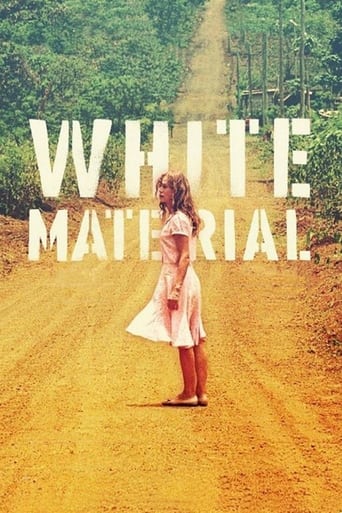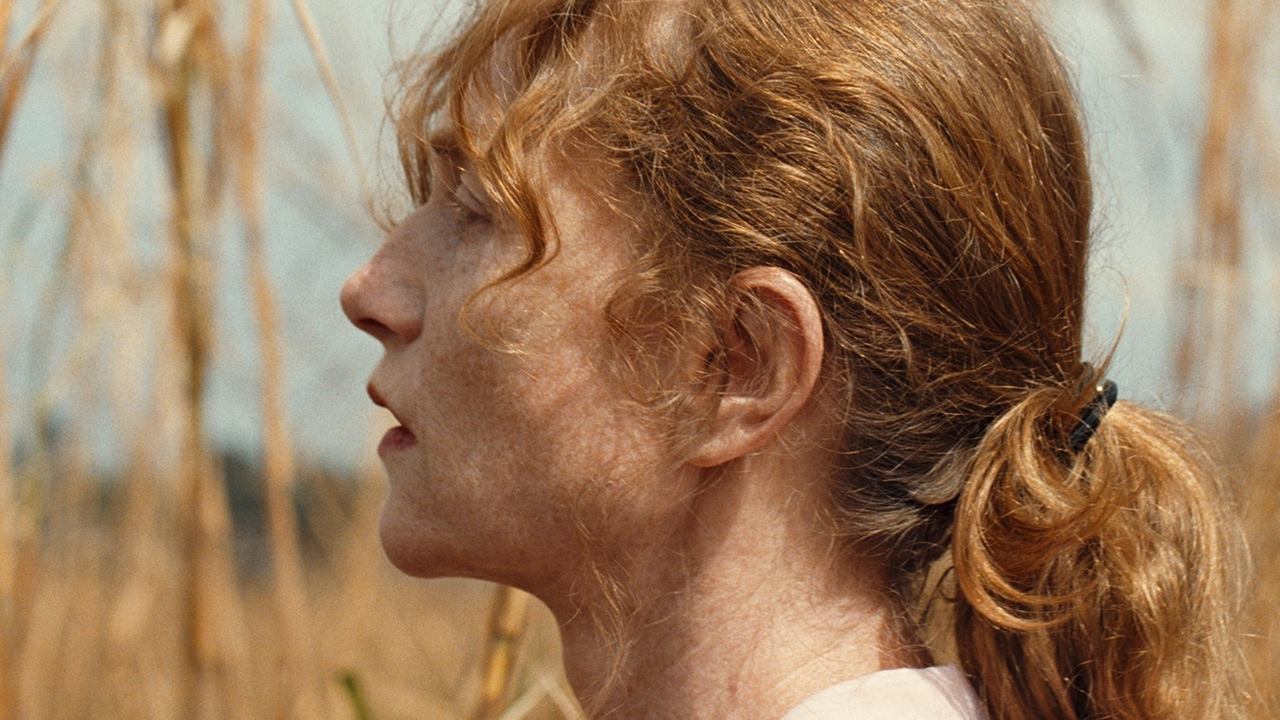batuhancanliturk
In our daily lives, we use the word "identification" for variety of things that concern social and environmental factors. However, we really do not know what the identification means. Identification is a complicated progress that person never has a full control over this psychological situation. In Lacanian terms, identification can be considered as an instance of comprehension (Lacan J., Gallagher C., 2002). Any external factor can captivate the people to make it become their self-component. "White Material" is a must-see example for the identification issues with questioning colonization.Although of her French origin, Maria considers herself as an African person. She has left France and never desires to return. She herself disdains the white French people with saying "These dirty whites... They don't deserve this beautiful land.". It can be obviously seen that she does not perceive herself as a French, while the rebels and the army call her as one such "dirty white" who is responsible for the country's filthiness. Although all threats, Maria does not retreat her actions for the coffee plantation. When she decides to travel for finding new workers, she even does not want to take the rifle with her. She believes that no harm might occur because of her appeal, identifying herself as an African makes her think in that way. As events spread, it is more clear to everyone around Maria that the situation is turning into less secure and more dangerous. It is important to see that what home means and how it feels to belong in a situation where others mark you an outsider. Manuel also suffers from being white. After two African boys mess with him and cut off his hair, he shaves himself and joins the rebels. We can see that, there is an obvious identity confusion for Manuel who lives for many years in this land as a white people. His depression is a sign of vulnerability for his belongings. Joining rebels can be interpreted as his reaction to again himself and his family to unravel confusion about his identity.As we learn that the coffee plantation is established and owned by Maria's father. His wish is maintaining plantation by his family especially by his daughter, Maria. Plantation has been operated with African workers for years and it seems like a colonial symbol throughout the history. Since the first European colonies on African continent, plantations have been a major slavery places for the African black people. They are purchase by the plantation owners and they can be traded or sold as goods (Austin G., 2017). Although plantations are not operated in that way now, they offer still bad facilities for the African people. They are pushed to work in unacceptable conditions in different types of plantations. Because of that, Maria thinks her father as a root for dirtiness of white people and consequently colonization. In this manner, killing her own father reveals her anger and sorrow about the African people who are the slaves of the plantation. Hence, she wants to end this colonization by destroying the foundation of it. Like mentioned earlier, her father can be seen as a foundation. Feeling and identifying herself as an African sets up the idea of releasing her inner-self and showing where she belongs.
Suradit
I lived in Africa for nearly 25 years and, whenever things went south no matter whether with trivial or major consequences , a common response was "AWA," Africa Wins Again.Usually the reason some undertaking failed was attributable to human intransigence and stubborn refusal to be accommodative, but the results were similar to those experienced when a plantation or garden was left untended. Africa reclaimed the situation (or the plantation) and things quickly returned to it more "natural" state, as if any traces of human intervention had been fully erased.This story has to do with a multi-generational French family living in an unnamed African country, apparently for quite a long time, as a revolution is unfolding that is both anti-government and anti-exploitation-by-colonial-types like the family.Aside from the utter despair for all parties concerned, it's a little difficult to see what the point of the movie was. Maybe if we had seen a little of the main characters before the revolution, their slide into hopeless refugees-to-reality would have been more telling. As it is, from the start nearly everyone seems to have already found his or her own way to deny what's going on and the viewer is more likely to feel apathy for everyone rather than any sympathy.The "star" is a woman who apparently never owned a comb or hair brush or any clothes appropriate to her daily activities. Aside from a pile of greasy, stringy, uncontrollable, overly long hair, she is a pretty one-dimensional, forgettable character. In addition to being in total denial about what's going on about her, she also seems unaware that her "school boy" son has gone completely over the wall. At least he has the sense to shave his head, something I kept wishing the woman would do.If the objective was to show how Africa will always win again and reduce anyone and everything to the lowest common denominator (presumably taking the racist view that whites will be reduced to the lowest level ... that of native Africans ... if they let their guard down), then it failed remarkably. Just about everyone in the movie seemed to be rather pathetic from the start. It may be true that "Things Fall Apart," but for some things/people, that was a pretty small change.
Howard Schumann
Set in an unnamed African country embroiled in a brutal civil war after transitioning from French colonialism to independence, the insanity of war has never received a more graphic portrayal than in Claire Denis' White Material. Named to reflect the contempt in which blacks hold the white colonialists, it is a film gripped by tension, violence, and eventual madness, but with a strong sense of place and a remarkable feeling of authenticity. Though White Material is less elliptical than many of her films which entice viewers to fill in the gaps with their own imagination, its lack of background information and non-linear chronology can make it, at least initially, a somewhat disorienting experience.Running a coffee plantation in the midst of the chaos, Maria Vial (Isabelle Huppert) lives with her ex-husband André (Christopher Lambert), her father-in-law Henri (Michel Subor) who owns the plantation, and her layabout teenage son, Manuel (Nicholas Duvauchelle). She insists on business as usual despite the fact that her workers have abandoned their jobs out of fear of the child soldiers who make up the bulk of the rebel army. Pursued by the government militia, a wounded rebel leader (Isaach De Bankole), known only as "the Boxer", takes refuge at the plantation, increasing the possibility of retaliation. Maria is warned by French soldiers from a helicopter that she should leave the country for her safety and that of her family, but she is proudly, if not blindly, determined to maintain the role that has always brought her security, though it is obvious from the first scene showing her alone on a road, that she has already been stripped of her colonial privileges. As author Andrew Sullivan once said, "When there's a challenge to our established world-view, whether from the absurd, the unexpected, the unpalatable, the confusing or the unknown, we experience a psychological force pushing back, trying to re-assert the things we feel are safe, comfortable and familiar."Refusing to face the inevitable, Maria goes into the village to recruit other workers, insisting that her coffee crop must be harvested, though it is unclear who she expects to sell it to. Without her knowledge, André begins to make arrangements to leave on his own and tries to make a deal with the mayor (William Nadylam) to sell the property. Even her son does not escape the madness. After being brutally attacked and stripped by young rebels, Manuel shaves off all of his hair, grabs a loaded rifle, and joins the rebel soldiers. In one of the most telling scenes, after several pharmacists are murdered, the rebel soldiers, who include both young boys and girls, sit on the grass ingesting the stolen drugs as if they were on a picnic. Despite the violence in White Material, there are some lovely moments evoked by cinematographer Yves Capes: wild dogs on a dirt road illuminated by the headlights of a car, the sounds of reggae music broadcasted by a disc jockey who promotes rebel causes, and the sight of Maria hanging onto the ladder of a bus filled with black refugees. Considering the depth and breadth of Denis' filmography, White Material may be a minor film, yet it is a graceful work of art, filled with a dreamlike quality that makes a strong statement about the dehumanizing effects of war, regardless of the rightness of the cause.
tigerfish50
Chaos reigns in some nameless, war-torn African nation. A murderous rag-tag guerrilla group searches the jungle wilderness for its charismatic wounded leader The Boxer, while some equally ruthless government soldiers try to hunt him down. As the signs of war multiply, The Boxer finds a hiding place in some deserted outbuildings at the Vial coffee plantation which has been abandoned by its workers. Fear surrounds the decaying French-owned estate where Maria Vial resides with her ex-husband Andre, their dissolute half-mad son and her hated father-in-law. Maria ignores warnings to leave and obsesses over the unharvested coffee crop, while Andre conspires with the sinister local mayor to hand over the property in exchange for safe passage out of the country.Director Denis makes no attempt to explore her characters, their relationships or the stories behind their present condition, apparently satisfied with documenting the surface symptoms of communal meltdown. She focuses on Maria, but reveals nothing about her heroine except for the foolish fixation on the neglected coffee beans. All the other characters possess similarly one-dimensional personalities - the Europeans are reduced to stereotypes of colonial decadence, while the Africans are portrayed as bloodthirsty and venal. When the film culminates in an orgy of capricious madness it's impossible to care about anyone's fate, because it's obvious they are symbols existing in a metaphor. Denis doesn't appear to care either.


 AD
AD



